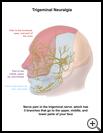
Trigeminal Neuralgia (Face Pain)
________________________________________________________________________
KEY POINTS
- Trigeminal neuralgia (TN) is a chronic condition that causes nerve pain in your face, teeth, mouth, or nose. You may have attacks of pain on one or rarely both sides of your face.
- Treatment may include medicine or surgery. Work with your provider to find the treatment that works best for you.
- Treating pain at the very first symptom may keep it from becoming as serious, and the pain may last a shorter time.
________________________________________________________________________
What is trigeminal neuralgia?
Trigeminal neuralgia (TN) is condition that causes nerve pain in your face, teeth, mouth, or nose. You may have attacks of pain on one or both sides of your face. TN is also called tic douloureux.
Men and women of any age can have TN, but it happens most often in women over age 40.
The problem usually appears suddenly and may get better on its own. It may also disappear for months or years and then come back. The painful attacks may get more frequent as you get older.
What is the cause?
The exact cause is not known. The problem is thought to happen when a blood vessel presses on the trigeminal nerve. The trigeminal nerve has 3 branches that go to the upper, middle, and lower parts of your face. Other possible causes include multiple sclerosis, stroke, tumors, or injury to the trigeminal nerve from an injury or surgery.
An attack may happen after:
- A light touch to the area such as from applying makeup, washing, or shaving
- Brushing your teeth
- Chewing or swallowing
- Exposure to hot or cold air or drinks
What are the symptoms?
- You may have intense stabbing or burning pain that comes in sudden jabs that lasts 1 to 15 minutes.
- Common areas of pain are the cheeks and jaw.
- How often you have symptoms varies from person to person. Between attacks, you may not have pain, or you may have a more constant dull ache.
How is it diagnosed?
Your healthcare provider will ask about your symptoms and medical history and examine you. There are no tests to diagnose TN. You may have tests or scans to check for other possible causes of the symptoms.
How is it treated?
Different types of medicine may be prescribed by your healthcare provider to help relieve pain. It may be hard to find the best treatment if the painful attacks happen weeks or months apart. You may need to use more than 1 medicine to prevent or control your symptoms. Work with your provider to find the medicines that work best for you.
If medicine does not give relief, or side effects from the medicine are a problem, you may consider surgery. There are several kinds of surgery that may help, including removing part of the nerve. After surgery, parts of your face may be numb. The numbness may be temporary or permanent. If you no longer have feeling in that area, you must be very careful to watch for injuries or physical problems in that area such as:
- Burns
- Dry eyes
- Chewing-related problems, including gum and other dental problems
Newer treatments that may help are radiation (radiosurgery), where it is possible to deliver radiation to just a small area of a nerve. Botox injections to the nerve may help in some cases. You can ask your healthcare provider if these treatments would be an option for you.
Some people may find pain is reduced or relieved by acupuncture, chiropractic adjustment, biofeedback, self-hypnosis, or meditation.
How can I take care of myself?
Keeping a pain diary may help you to see which activities or conditions cause your pain. Then you will know what you need to avoid.
Treating pain at the very first symptom may keep it from becoming as severe, and the pain may last a shorter time.
Ask your provider:
- How and when you will get your test results
- How long it will take to recover
- If there are activities you should avoid and when you can return to your normal activities
- If there are foods or drinks you should avoid
- How to take care of yourself at home
- What symptoms or problems you should watch for and what to do if you have them
Make sure you know when you should come back for a checkup. Keep all appointments for provider visits or tests.
You can get more information from:
- The Facial Pain Association
800-923-3608
http://www.fpa-support.org/


